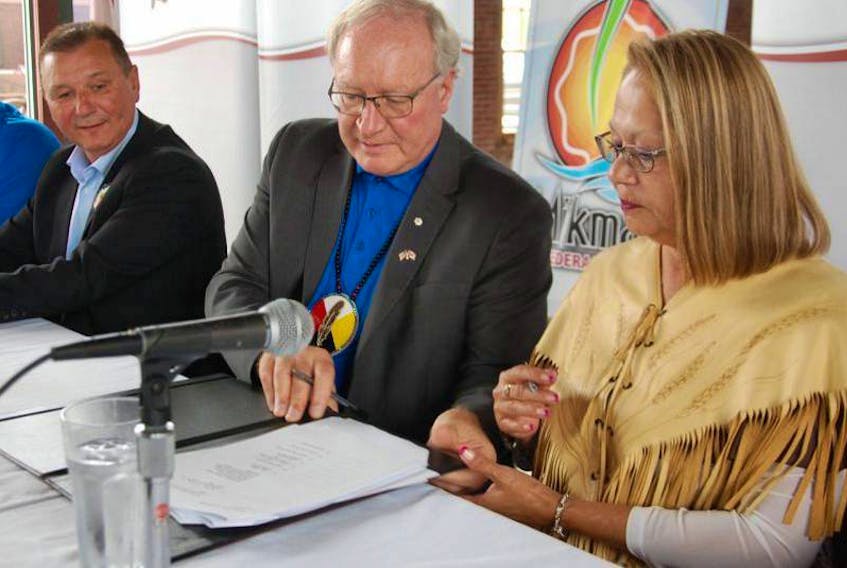BY PETER MCKENNA
GUEST OPINION
With a court date set for mid-January 2018, the legal showdown over the Mill River golf resort between the P.E.I. government and the Mi’kmaq chiefs is fast approaching. To be sure, both sides have a great deal at stake.
But it is the Wade MacLauchlan government that has the most to lose - and lose it will. And that critical loss will profoundly impact the future development of this tiny province of P.E.I.
It will also have important ramifications for the rest of the Maritimes. Since the Mi’kmaq of this region never extinguished title to the land, any legal advances in P.E.I. will have a spillover effect for both Nova Scotia and New Brunswick.
So here’s a news flash for those who may not know: the people of this region reside in unceded Mi’kmaq territory. While Peace and Friendship Treaties were signed in the early 1700s, there are no comprehensive land treaties in Atlantic Canada - that is, the Mi’kmaq did not formally agree to relinquish ownership of the land as happened in other parts of Canada (i.e., via the so-called numbered treaties).
Ergo, Crown land in these parts is legally Mi’kmaq land - and that includes provincially-run golf courses and resorts, lands set aside for wind turbines and even the Charlottetown Experimental Farm (federal) property in the city’s capital.
Accordingly, there is no way that the Mi’kmaq of this province can look the other way when it comes to the 325 acres of ancestral land in Mill River. Establishing such a legal precedent would underscore any future Mi’kmaq claims to land in P.E.I. They absolutely have to make a stand here.
Notwithstanding the provincial government’s claim of proper consultation with the Mi’kmaq leadership, which is vigorously refuted by the chiefs, I can’t see why Premier MacLauchlan is willing to undertake such a risky and misguided course of action.
Has no one in government been following recent legal jurisprudence in Canada? Have they not read the June 2014 Supreme Court of Canada landmark Tsilhqot’in Nation decision?
According to that legal ruling, Indigenous land in British Columbia, where title has not been extinguished, still belongs to Indigenous peoples. Moreover, any future development on that land must have the consent (and not just holding consultations) of the Indigenous owners of those ancestral lands.
The decision makes very clear the following: “This gives them the right to determine, subject to the interest of group title held for future generations, the uses to which the land is put and to enjoy its economic fruits.” And in a recent submission to the University of New Brunswick Law Journal on the Tsilhqot’in Nation decision, Robert Hamilton concluded that, “it is likely that title has yet to be extinguished in (the Maritimes) and remains a legal interest where it can be proven to have existed.”
Furthermore, the Vancouver-based POLIS Water Sustainability Governance concluded in its legal brief on the subject: “Justification for interference with title can be achieved under exceptional circumstances only and must demonstrate that interference would only further reconciliation.” And any justification for proceeding on unceded ancestral Aboriginal territory without Indigenous consent would not be sufficient - including a justification based on economic reasons.
It makes no sense, then, for the MacLauchlan government to test the Tsilhqot’in precedent in court. Nor does it do anything to further reconciliation with the First Peoples of this land.
So why is the provincial Liberal government of P.E.I. willing to risk so much? It seems clear that the government has a poor legal case. Are members of the provincial Liberal caucus aware of this highly reckless gambit?
Remember this: if the province loses the legal case, which is most likely, given past precedent, it will open up the possibility of Mi’kmaq claims to watercourses and other water sources in P.E.I. It could also see claims of Aboriginal title to all provincial and federal parkland in P.E.I.
More to the point, any potential resource development project going forward in P.E.I. Crown land would have to have the consent of the Mi’kmaq. And, most assuredly, no golf course on Crown land could be sold without the approval of the Mi’kmaq leadership.
Is this what the people of Prince Edward Island want?
Here’s some free advice to the premier of P.E.I.: I would strongly advise you to work out an arrangement with the Mi’kmaq before the Mill River case actually gets to court. There is far too much at stake here for the provincial government to simply roll the legal dice and inevitably lose badly. And that certainly would not bode well for the governing Liberals in the upcoming 2019 provincial election.
- Peter McKenna is professor and chair of political science at the University of Prince Edward Island.









